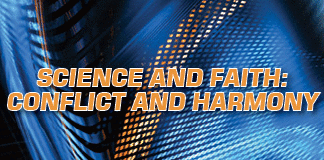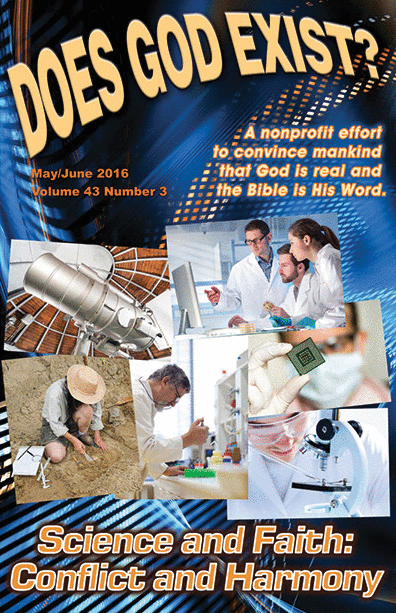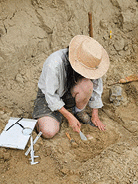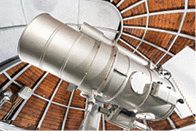

Numerous writers have made strong statements describing Christianity as the fountainhead of modern science. Equally strong statements have been made by numerous writers calling Christianity the greatest opponent of scientific progress. There is great inconsistency in both of these viewpoints if for no other reason than the fact that not everyone interprets “Christianity” the same way. The name “Christian” is a label applied to the followers of Jesus for the first time at Antioch (Acts 11:26) well after the church had been established. The word literally means “belonging to Christ” (Young's Analytical Concordance). It had nothing to do with any denomination but was applied to individuals.
Thirteenth-century theologian Thomas Aquinas and his contemporaries taught that God was separate from the world and that experience was necessary to discover what God had done in creation. The view maintained that there were two great books which came from God — knowledge from Scripture and knowledge about the physical world. At the time of the Reformation a movement away from this idea culminated in Francis Bacon's Novum Organum written in 1620. Bacon insisted that gathering facts through experimentation was the way to get a true picture of the world. The Reformation also prompted the claim that the Scriptures should be read in a “literal” way. That led to the view that the Scriptures should be studied first for what they described historically and for their connection to Christ. This meant that all science had to fit into the theologians' interpretation of what the scripture said. In today's world “literal” has many different meanings. Some attach “literal” to a particular translation or a particular denominational interpretation and want to filter science through denominational teachings. There are others who want science to tell us how to interpret Scripture.

Roman Catholicism produced great scientists and great scientific breakthroughs in the fifteenth through seventeenth centuries. Copernicus, a Roman Catholic, gave us the heliocentric view that the planets orbit the Sun rather than everything orbiting the Earth. Martin Luther and John Calvin denounced this view as heretical because they believed this was not taking the Bible literally. As leading Protestant theologians of their day, these two men viewed science as unrelated to Scripture or faith while major scientists at the time credited God with their understandings and discoveries. Johannes Kepler, a Lutheran, credited God with his understanding of the motions of the planets. When the Royal Society was established in 1660 there were many Puritans who were part of the formation of this auspicious scientific organization. Isaac Newton, one of the greatest scientists of all time, spent more time studying the apocalyptic books of the Bible than he did doing scientific investigations.
 When Charles Darwin came on the scene with his Origin of the Species in 1859, there were numerous social and political issues with religious implications. Mark Noll of the University of Notre Dame has written, “Conservative white Protestants in the American South mostly opposed evolution, because it undercut the biblical literalism that had provided their defense for slavery” (“The History of Science and Christianity,” When God and Science Meet, © 2015, NAE Publishers, page 14). In modern times we have seen evolution opposed for similar reasons. As far back as 1860 we see theologians like Asa Gray of Harvard promoting evolution as the method by which God accomplished the creation. Others have made similar statements since then. Opponents of evolution have focused on issues like the age of the earth and dispensational doctrines rather than what Scripture actually says. The media have interpreted opposition to evolutionary theory as opposition to science as a whole. Many conservative Christian writers and speakers have left the impression that science is an enemy of faith, and any attempt at reconciling science and faith is viewed as compromising and weakening faith.
When Charles Darwin came on the scene with his Origin of the Species in 1859, there were numerous social and political issues with religious implications. Mark Noll of the University of Notre Dame has written, “Conservative white Protestants in the American South mostly opposed evolution, because it undercut the biblical literalism that had provided their defense for slavery” (“The History of Science and Christianity,” When God and Science Meet, © 2015, NAE Publishers, page 14). In modern times we have seen evolution opposed for similar reasons. As far back as 1860 we see theologians like Asa Gray of Harvard promoting evolution as the method by which God accomplished the creation. Others have made similar statements since then. Opponents of evolution have focused on issues like the age of the earth and dispensational doctrines rather than what Scripture actually says. The media have interpreted opposition to evolutionary theory as opposition to science as a whole. Many conservative Christian writers and speakers have left the impression that science is an enemy of faith, and any attempt at reconciling science and faith is viewed as compromising and weakening faith.

If we listen to what the Bible says about science and faith, we will understand that true science and biblical faith MUST be in harmony because they have the same author — God. Webster's dictionary defines science as “knowledge” and points out that the word comes from the Latin “sciens, meaning to know.” The word “science” in the King James Bible is used once in the Old Testament and once in the New Testament. In Daniel 1:4 it is from the Hebrew madda, meaning knowledge. In 1 Timothy 6:20 it is from the Greek word gnosis, meaning to know.
Both science and theology need wisdom. Proverbs 8 is a fascinating chapter written by “Wisdom.” In verse 12 (KJV) wisdom says, “I, wisdom dwell with prudence, and find out knowledge of witty inventions.” Starting in verse 22 wisdom tells us that God possessed me in the beginnings of his way, before his works of old. “I was formed long ages ago, at the very beginning, when the world came to be.” Wisdom then describes critical elements of the creation of the earth and ends with “For those who find me find life and receive favor from the LORD” (verse 35).

Psalm 19 begins by stating, “The heavens declare the glory of God; and the skies proclaim the work of his hands.” Psalm 139:14 speaks of the intricacies of the human body and moves on to praise God for what can be seen in how our bodies are made. Proverbs 6:6 – 8 tells the indolent to study the ant and see how its life processes can bring them to wisdom. To bring Job into an understanding of how he needs to change his thinking, God uses science to challenge him. In chapters 38 and 39 scientific challenge after scientific challenge are given to Job. We are still struggling with many of those challenges today. Jesus challenged people to look and learn from the flowers in Matthew 6:28. Romans 1:19 – 20 calls us to know God is real by looking at the creation around us.

The conflict between science and faith always has been and continues to be a battle between humans on both sides of the conflict who put their personal agenda above what is real. It is preachers versus scientists, not science verses faith. It is bad science and bad theology in the minds of misguided human beings that create the conflict. Not only is this stated by seeking people on both sides of the issue, but it is also stated in 1 Timothy 6:20 – 21, “… Turn away from godless chatter and the opposing ideas of what is falsely called knowledge, which some have professed and in so doing have departed from the faith.”
 The purpose of the Does God Exist? ministry is to plead with people of science and people of faith not to view their disciplines as enemies of the other. Our articles and materials seek understanding and reconciliation. That does not mean we know it all or that there are not some conflicts that need to be resolved. Galileo was a scientist and a Christian who got into trouble for showing that science indicated things that were contrary to official religious doctrines of his day. In a letter defending himself he wrote, “The Bible shows the way to go to heaven, not the way the heavens go.”
The purpose of the Does God Exist? ministry is to plead with people of science and people of faith not to view their disciplines as enemies of the other. Our articles and materials seek understanding and reconciliation. That does not mean we know it all or that there are not some conflicts that need to be resolved. Galileo was a scientist and a Christian who got into trouble for showing that science indicated things that were contrary to official religious doctrines of his day. In a letter defending himself he wrote, “The Bible shows the way to go to heaven, not the way the heavens go.”
Wisdom is critical to both science and faith, but our attitude toward science and faith determines how we apply the knowledge available to us. The more we know of the creation, the closer we get to the Creator.
Picture credits:
Cover photo composite: assembled by Roland Earnst using the following pictures:
© Bella D. Image from BigStockPhoto.com
© alexraths. Image from BigStockPhoto.com
© l i g h t p o e t. Image from BigStockPhoto.com.
© astropix. Image from BigStockPhoto.com.
© Sopotniccy. Image from BigStockPhoto.com
© andrianocz. Image from BigStockPhoto.com.
© Sergey Nivens. Image from BigStockPhoto.com
